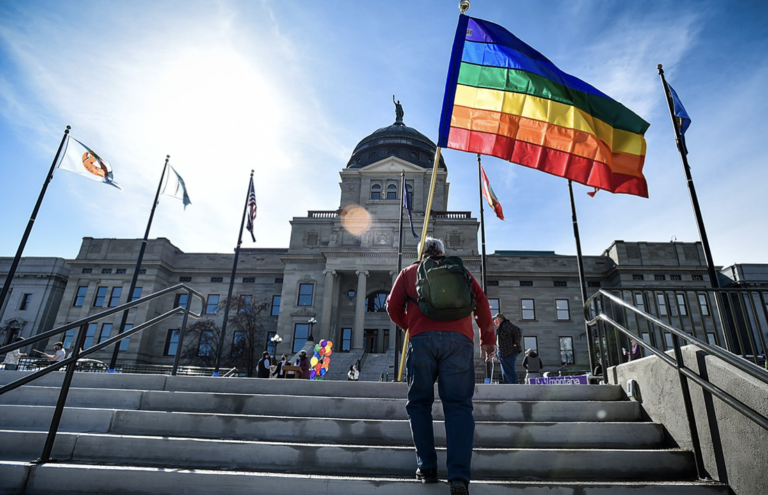Photo from the ACLU
GW’s advocacy for the transgender community comes at a time of unprecedented growth in legislation that negatively affects LGBTQ people. The Trans Legislation Tracker reports that 85 bills have passed in 2023 that seek to “deny access to basic healthcare, legal recognition, education, bathrooms, athletics or the right to openly exist in public schools” for transgender people.
Angela Zimmerman, a tenured professor at The George Washington University, transitioned in 2020 after nearly two decades of teaching. She praised GW’s policies and faculty members for their support. “It’s been really, really supportive for me at GW, and I didn’t expect that acceptance,” said Zimmerman. The reaction of faculty and students toward Zimmerman points to a culture of transgender visibility and acceptance at the campus.
The Trans and Non-Binary Students of GW Club, or TNBS, espouses the same message of gender acceptance that Zimmerman felt during her transition. Luke Fernandez is the underclassman representative and social media manager for TNBS. He credits the club for creating community and belonging through social, educational and advocacy-based events. These events, as explained by Ari Brandy, president of TNBS and a junior at the university, are made possible with GW’s support and resources. “The Student Association provides funds that help TNBS foster a welcoming and comfortable environment for our members, and we work closely within the MSSC and LGBTQ Resource Center to convey concerns of trans students to university officials at monthly meetings,” said Brandy. GW provides other clubs that also “explore the diversity and complexity of the trans experience at GW,” said Brandy. Some of these additional clubs and advocacy groups include Allied in Pride, Queer and Trans People of Color and the Business Pride Network.
The Multicultural Student Services Center, or MSSC, works closely with TNBS and other advocacy clubs to assist with supplies and promotion events. They also provide resources on their website concerning the university’s non-discrimination, gender identity and name change policies. Additional resources include information on gender-inclusive housing and resources from the Sexual Health and Gender Affirmation Center at the GW medical facilities.
In addition to welcoming LGBTQ faculty, student-led clubs and extensive resources, The George Washington University supports its transgender population through its programs and course offerings. Adrienne B. Hancock is a professor at GW and specializes in voice and communication studies of transgender people. She has taught numerous courses on speech and voice disorders that explore the influence of gender on communication. “Overall, my scholarship and advocacy work calls for a culturally responsive, person-centered approach to SLP [speech-language pathology] support of transgender people who are dissatisfied with their communication situation,” said Hancock. In acknowledging the effect of misgendering and dysphoria around gender, Hancock views her class as a reinforcement of the existence of social challenges faced by many transgender and non-binary people.
Hancock began her studies on transgender voices when she came to the university in 2005 with the mission of “systematically improving quality and access to speech and language pathology services beyond this campus,” said Hancock. Hancock recognizes the support that GW has given her through grants for her research and tenure, along with the resources that GW’s Speech and Hearing Center provides to transgender clients making voice and communication changes.
The university also has an LGBT Health Policy & Practice Graduate Program. Stephen Forssell, founder and director of the program, has been a professor with GW for 20 years. Forssell taught undergraduate courses on health disparities among sexual and gender minorities before creating the program in 2013. “In 2011, the Institute of Medicine released a report on health disparities in LGBTQ people, and I realized the medical community was ready to join social scientists to support graduate-level training of health professionals,” said Forssell.
Forssell wanted to create a program for the health of LGBTQ people as an extension of his interests and studies on sex, gender and identity development. “GW is very supportive. It’s exciting! I focus on the mission and let that drive me,” said Forssell. The LGBT Health Policy & Practice Program seeks to educate society on the impacts of gender-based discrimination. “It [discrimination] affects both mental and physical health, and we can do better as care providers,” said Forssell. The program has produced roughly 100 graduates in the ten years since its founding.
In addition to the LGBT Health Policy & Practice Program, GW created the first graduate program in women’s studies in the United States: the Women’s, Gender, and Sexuality Studies Program. The WSSG program is another example of how GW seeks to combat sexual and gender inequalities through education, including those of transgender women.
As exclusionary legislation for the transgender community continues to increase at an exponential rate, GW seeks to spread awareness and educate on health and social disparities faced by the LGBTQ community through its programs and resources.






